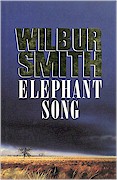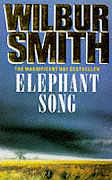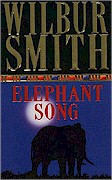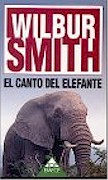 |
Wilbur's
comments on his inspiration for ELEPHANT SONG:
Elephants, especially, hold a special place in the author's affections.
They are among the most intelligent and fascinating of all
animals: they have a very complex social order. The elephant song, which I describe in the
novel, is their form of communication. It is quite a complex language, not unlike the song
of the whales. I have heard it many times, but you do have to be very close to a herd. You
can get within ten or fifteen feet if the wind is right, especially if it is a group of
bulls. They are less observant and less cagey than the females. Often I have listened for
an hour or more - the whole time this rumbling and squeaking goes on as they communicate
with one another. To me, somehow, the elephants seem to symbolize all of African wildlife.
They feature among my earliest memories, and I am very much concerned with their survival.
That is why I wrote ELEPHANT SONG, really.
He remembers a trip his father took him on when he was only twelve.
I went into the interior forests and met some of the pygmies
who live there. I was fascinated by them. Sadly, their culture is being adulterated, and
they do not adapt well to western ways. They get all sorts of problems, not least
alcoholism and venereal disease. The destruction of the forest is also, in the long term,
putting them at risk of extinction.
Whenever he is away from Africa, Wilbur longs to be back, just as his
novel's fictional hero, Daniel Armstrong, does. They
say that if you were weaned on Zambezi water, you can't really ever escape from it. I feel
very much as home in Africa, among the people. The various racial groups and tribes are
endlessly fascinating to me.
|
 |
Wilbur's
views on ivory hunting (report in South African newspaper The Argus,
Saturday 9
August 1997):
WILBUR SMITH STIRS UP
IVORY DEBATE
Best-selling author Wilbur
Smith has defended the hunting of elephants and the controlled sale of
game products - including ivory - as the only way to save Africa's wildlife.
Writing in the latest issue of African Safari Magazine, Smith plunges
into the controversy over ivory sales which has pitted government, animal rights
activists and conservationists against each other worldwide. The South African
adventure-novelist says it was atrocious
that Kenya burned
several million rands (the South African currency) worth of tusks to support a total ban on trade in ivory in
an attempt to end poaching. It was like taking money that could have been
better utilized for conservation and setting fire to it, he writes.
His view will be welcomed by the
governments of Zimbabwe, Botswana and Namibia, which won the
right to work towards resuming a controlled trade in ivory after a bitterly
fought battle at the meeting of the Convention on International Trade in
Endangered Species (Cites) in Harare last month. But they will not be
so pleased by his reference to government corruption as an African
disease or his statement that if you have black governments managing
their country exclusively for black tribes-people and wildlife becomes
undesirable, then we're going to lose it. Smith's argument is that if you try to convince a subsistence farmer with a large family that the
elephant or the lion is a beautiful animal and should be conserved, he will
think you are out of your mind.
The buffaloes graze on the grass
that he needs for his cattle, a crocodile probably killed his grandmother and
the leopard is killing his goats. You have to prove to him that the wildlife is
of value and that it is worth his while to make some sacrifice. He says
people will protect the animals if it can be shown that they will benefit from
the money earned from hunting or sales of wildlife products.
|
![]()
![]()






![]()
![]()